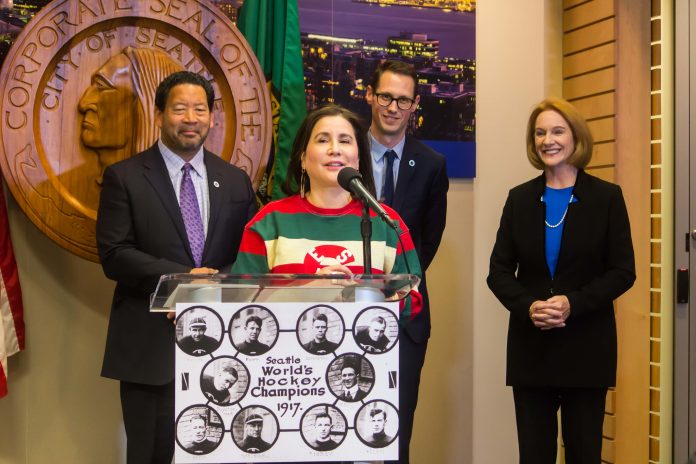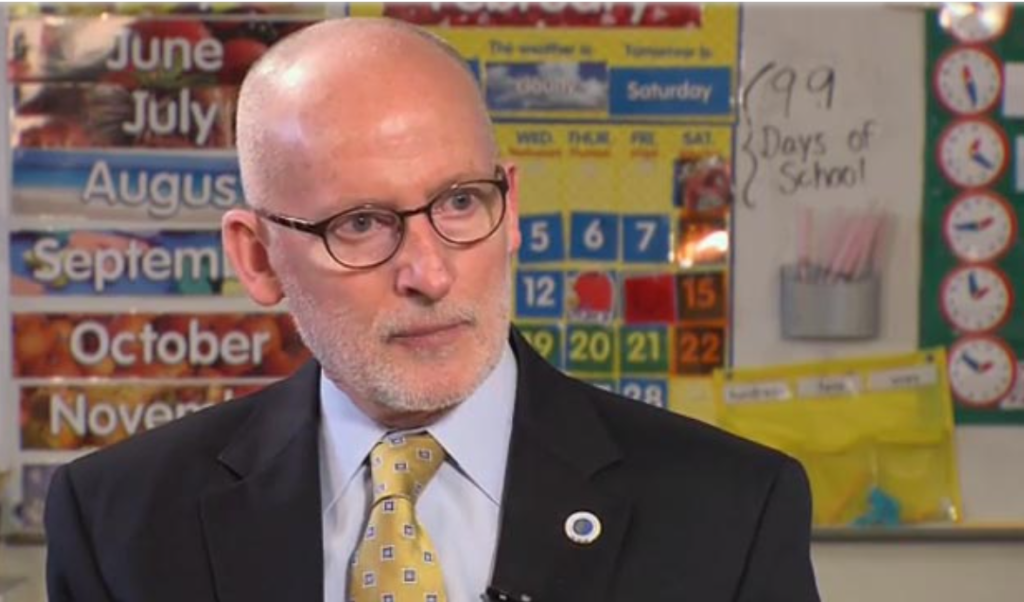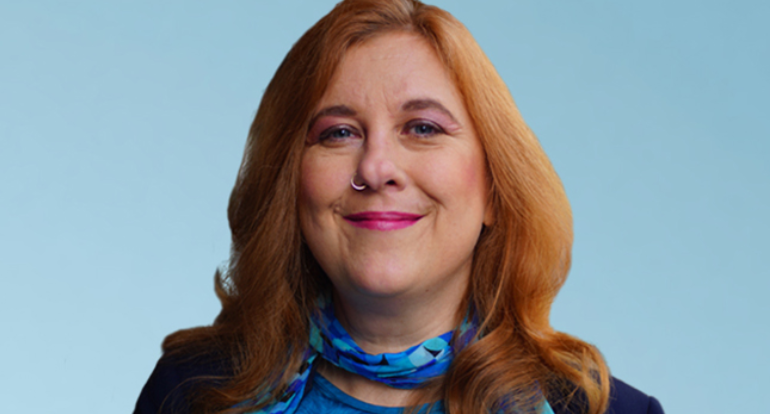
Next month the Seattle City Council will appoint a new Council President with the departure of Lorena González, who ran for mayor but lost. The Seattle Times Editorial Board and Mayor-Elect Bruce Harrell are lobbying hard for Debora Juarez (District 5) to get that distinction.
“The council’s next president should be North End Councilmember Debora Juarez,” Seattle Times publisher Frank Blethen and his compatriots wrote in a Tuesday op-ed. “Her pragmatic record on the council and outstanding civic résumé indicate she would work toward City Hall consensus instead of continuing the council’s pattern of bitter ideological fights.”
Taking up the cause of Indigenous representation, the Seattle Times Editorial Board argued not having an Indigenous president in the council’s 152-year existence was “a historical omission in the largest U.S. city named for a Native chief” and should be corrected by electing Juarez, who is an enrolled member of Blackfeet Nation. This same train of logic did not lead that editorial board to endorse Colleen Echohawk in the mayoral primary to set another Indigenous first.
Juarez’s major rival for Council President is Lisa Herbold (District 1). Both were first elected in 2015, making them the two senior-most members after Kshama Sawant, who was first elected in 2013. As a member of Socialist Alternative and frequent critic of the Democratic establishment, Sawant appears to have neither the inclination nor support to be council president.
Harrell was happy to weigh in: “Councilmember Juarez would be a more effective council president,” the editorial board reported Harrell told them. “And I believe she’ll be more effective because Councilmember Herbold seems to still succumb to this notion it’s us versus them, that it’s the city council versus the mayor. And I believe Councilmember Juarez is an independent thinker and looks at the city as a whole, and her department as a whole, but also realizes that the city wins when we work collaboratively.”
Taking this narrative and running with it, the Blethen gang painted a potential Juarez coronation as a moment of catharsis for the city: “Selecting her as leader would be a sign the nine-member council, with one newly elected member, is open to constructive cooperation with the new mayor after endless confrontation with departing Mayor Jenny Durkan.”
This reading of history is one-sided and misleading since Mayor Durkan invited conflict with the council and, at times, even went out of her way to pick fights or force them to divine her position with little inkling as to her stance. However, the first rule of covering Seattle politics from the center or the right is that it’s always the City Council’s fault. And so the story goes.
In another bit of revisionist history, the Seattle Times editorial board argued it “was the council’s knee-jerk budget cuts spurred the departure of hundreds of officers and Chief Carmen Best.” In reality, the Seattle Police Department’s (SPD’s) failure to retain officers is largely of its own making and reflective of national trends not linked to budget cuts (even police departments with increasing budgets have seen their ranks shrink due to attrition). The City Council did vote to make some minor budget reductions to SPD and to civilianize some roles, such as the emergency call center and parking enforcement, but the exodus of officers predated that budget vote, and SPD’s hiring plan for 2022 was fulling funded in the budget passed last month.
Mayor-Elect Harrell’s pledges that Juarez will transcend the “us versus them” and “city council versus the mayor” divides are also interesting. Such promises are undermined by the editorial’s other major argument in favor of Juarez: that she is a close ally of Harrell and a “moderate progressive” like him who will “restore public safety” as opposed to sending officers packing. It’s not transcending a divide to call Herbold divisive, distort her positions, and lobby for a “moderate progressive” ally over her as Council President. That’s simply picking a factional fight and calling your opponents divisive for existing. That’s an old political trick and hardly models the “collaborative” spirit that Harrell and the Blethen gang say they want to engender.
The Seattle Times is going all in on Juarez even as they admit to disagreeing with her on inclusive zoning and the first head tax vote: “This editorial page has not always agreed with Juarez. She has supported large-scale upzoning and has a mixed record on taxing the city’s biggest employers.” Juarez did vote to repeal the head tax and voted against the JumpStart Seattle tax, which likely absolved her somewhat in their eyes.
The editorial board of the paper of record for the region getting so heavily involved in an internal fight about electing a council president seems new. Certainly they must feel it is important to spend so many words on it.
What does the Council President do?
The council president presides over council meetings, setting the agenda and picking which committee that bills end up in. They also fill in as mayor when the sitting mayor is incapacitated, recalled, or resigns, as happened when Harrell was council president in 2017 after Mayor Ed Murray resigned. The first act of an aspiring council president is committee assignments. In early January, a hopeful council president will propose legislation affirming herself in that leadership position alongside the slate of committee chairs and posts. Convincing enough colleagues that that arrangement is favorable is how they ensure that bill passes, inaugurating their reign.
The Seattle Times Editorial Board argued Juarez “can put council members in roles where they can do the most good.” In the next breath, they made the case for one particular shakeup: “Herbold has chaired the council’s public safety committee for two turbulent years because outgoing Council President M. Lorena González assigned her to that powerful committee.”
Two years ago, The Urbanist covered the pushback created by Council President González’s appointment of conservative-leaning Alex Pedersen as transportation chair, but ultimately that appointment went through. Changing the roster can resemble a game of musical chairs; many councilmembers may already prefer the chair and committee assignments they have. Given the workload, they typically chair just one committee and serve as vice chair on another and as a member on three additional committees.
Many multimodal advocates will likely hope to see a new transportation chair after Pedersen largely confirmed their fears and spent the last two years quietly lobbying to kill protected bike lane projects and loudly demanding bridge maintenance take precedence over all else, with repeated pushes to raid multimodal funding for that purpose. Pedestrian deaths continue to rise with little new efforts from the transportation committee.
Whether Pedersen, Herbold, or anyone else is given a new committee to chair will depend on the new council president. The education and governance committee is lacking a chair with González’s departure and the simplest change would be to give that chair to incoming Councilmember Sara Nelson. However, as the Seattle Times editorial hinted, moderates might be setting their aim higher and looking for a bigger shakeup to seize the reins of more influential committees. Perhaps they hope Nelson, who ran on boosting SPD funding and returning to a more incremental approach to police reform, would take over on public safety committee. The real coup would be budget chair, which is arguably more influential than council president. That seat currently belongs to progressive stalwart Teresa Mosqueda, who decisively won reelection by 19 points this year.
But, as the centrist faction gained just one council seat in 2021, a full centrist power grab might be a heavy lift for now.
As for Juarez, she appears to want the position given the media blitz. That said, she’s often grown impatient during council meetings and wondered out loud when the speechmaking and deliberation would end, seeming to not really want to be there. A leader that keeps a legislative body on task and plowing through the agenda can be a valuable asset. But if Juarez gets the post and takes this tendency too far she could end up alienating her colleagues. Or she may end up finding the job tedious and taxing and miss the days when she was free to grumble from the sidelines.
Another wave of Harrell Administration appointments
To accompany his push to elect Juarez council president, Harrell also rolled out out another batch of appointments on Wednesday highlighted by Kendee Yamaguchi as his third and final deputy mayor and former state representative Gael Tarleton as his head of intergovernmental relations. Yamaguchi leaves a post as Executive Director of Snohomish County and served in the Clinton, Gregoire, and Inslee administrations.
Tarleton was a Seattle port commissioner and a defense intelligence analyst before her stint in the state house. She has been a vocal advocate for prioritizing car infrastructure, such as the SR-99 car tunnel and a one-to-one replacement for the Magnolia Bridge.
Two more former Harrell Council staffers were also appointed to prominent positions. Jennifer Samuels will be chief of staff and Jeremy Racca will be legal counsel, joining Vinh Tang who was already appointed “Technology and Performance Advisor.”
- Kendee Yamaguchi, Deputy Mayor of External Affairs
- Gael Tarleton, Interim Director of Intergovernmental Relations
- Matt Chan, Special Advisor for Public Engagement
- Derrick Wheeler-Smith, Interim Director of the Seattle Office for Civil Rights
- Mariko Lockhart, Deputy Director of Seattle Department of Education and Early Learning
- Jennifer Samuels, Chief of Staff
- Jeremy Racca, Legal Counsel
- DeVitta Briscoe, Gun Violence Prevention Liaison

An earlier wave of appointments announced December 13th included:
- Monisha Harrell, Senior Deputy Mayor
- Tiffany Washington, Deputy Mayor of Housing and Homelessness
- Tim Burgess, Director of Strategic Initiatives
- Dan Eder, Director of Policy
- Adiam Emery, Chief Equity Officer
- Marco Lowe, Chief Operations Officer
- Julie Dingley, Interim Director of City Budget Office
- Pedro Gómez, Director of External Affairs
- Gerald Hankerson, External Affairs Liaison
- Vinh Tang, Technology and Performance Advisor
Overall, the hires represent a good deal of continuity with the past and a fair bit of insularity rather a radical break with previous administrations. Senior Deputy Mayor Monisha Harrell, for example, is the mayor-elect’s niece and managed his mayoral campaign, while Deputy Mayor Washington also directed homelessness policy for Durkan. Burgess, like Harrell, had a 12-year career on City Council, before he shifted over to running political action committees, raking in campaign contributions, and orchestrating negative hit pieces, sometimes against former colleagues.
One big exception to that continuity pattern was at the Seattle Department of Transportation where Harrell decided to fire Director Sam Zimbabwe. Letting go of Zimbabwe, particularly when nearly a dozen other departments are led by interim directors including the Office of Housing and the Office of Planning and Community Development, demonstrates that Harrell is willing to instigate major shake-ups when he considers them necessary. Alas, that shakeup targeted a department that had been building momentum.
Doug Trumm is publisher of The Urbanist. An Urbanist writer since 2015, he dreams of pedestrian streets, bus lanes, and a mass-timber building spree to end our housing crisis. He graduated from the Evans School of Public Policy and Governance at the University of Washington in 2019. He lives in Seattle's Fremont neighborhood and loves to explore the city by foot and by bike.


